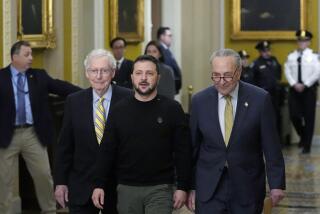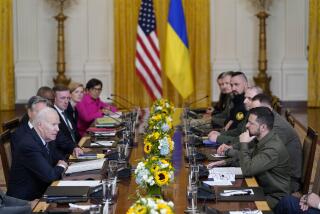Hussein’s Iraqi Foes Appeal for Aid : Mideast: Leader of a coalition opposing Baghdad regime says no monetary support from the U.S. has been received.
- Share via
DAMASCUS, Syria — A leader of the U.S.-backed Iraqi coalition seeking to overthrow President Saddam Hussein said this week that the opposition is fraying badly, adding that there is little chance of toppling the Baghdad regime without urgent Western assistance and intervention.
In an interview with The Times in a heavily guarded apartment, Iraqi Kurdistan Front leader Jalal Talabani also insisted that his group, the largest, best-armed opposition force inside Iraq, has yet to receive a dollar in covert or overt support from the United States.
Talabani made his statement in response to questions about published reports from Washington that the Clinton Administration was considering halving the $40-million covert fund used by the CIA to undermine the Iraqi regime after the U.S.-led coalition drove its occupation forces from Kuwait two years ago.
“How are they spending this money? Even I would like to ask this, because the Iraqi Kurdistan Front did not receive even $1 from the United States of America,” Talabani, who is among the half-dozen leaders of the main opposition alliance, the Iraqi National Congress, said Monday. “So, when they talk about reducing it from $40 million to $20 million, for us it’s the same. Nothing. Believe me, nothing. And this is going to frustrate the people in Iraq.”
Talabani confirmed that questions about the covert fund and the Iraqi opposition’s dire need for direct American assistance will top the national congress’s agenda Tuesday, when its leaders are scheduled to meet with Secretary of State Warren Christopher in Washington.
The meeting will be the first formal session between the Administration and the coalition, which includes other Kurdish groups and Tehran-based Shiite opposition leaders from southern Iraq.
Talabani indicated that several members of the congress may begin negotiating offers of autonomy and self-rule with Hussein’s regime if no American support is forthcoming.
“Saddam Hussein has sent messages from time to time for reconciliation with our opposition groups,” Talabani said, adding that the most recent olive branch was extended through Palestinian leader Yasser Arafat, who met with the Iraqi leader in February. “If the Kurds will be frustrated with the United States and other European countries, then public opinion will turn toward supporting negotiations with the regime.”
Already, the Kurdish leader said, “some people are leaving the coalition” because there has been no support from America and its allies. Without such aid, he asserted, the coalition stands little chance of bringing down the Iraqi regime from within or outside the government.
“There are many people opposed to the regime, but there is a need to bring them together,” added Talabani, whose group controls more than 40,000 square miles of Iraqi territory under an allied-patrolled “no-fly” zone in northern Iraq.
Both the Kurds and the Shiites lack sufficient funds, he said, just to feed and train their dissident armies, let alone to recruit troops from within Hussein’s reconstituted armed forces; those forces recently were expanded to their original, prewar force of 30 divisions.
“I think for a long time the Americans were waiting for a military coup against Saddam, but I don’t think that’s possible anymore,” Talabani said. “To revolt against a monster like Saddam Hussein, you need a very high morale. You need to pay the troops and feed the troops after they come over to your side. So I personally am not expecting any military coup now.”
Talabani further confirmed recent reports that Iraq is strengthening its economic position, in part through expanding cross-border trade with its traditional enemy, Iran. Although Tehran denies the reports, Western intelligence officials and Iraqi dissidents assert that Baghdad has traded large quantities of cement and fertilizer to Iran in exchange for desperately needed food and items such as tires; the trade is part of Baghdad’s effort to get around crippling, U.N.-sponsored trade sanctions against Iraq.
Considering all the factors, Talabani said the absence of future American aid to the opposition alliance would lead him to conclude that “the United States is not sincere in helping the Iraqi people topple Saddam Hussein. I was all along believing the U.S. was in favor of eliminating Saddam Hussein. But now, I doubt it.”
More to Read
Sign up for Essential California
The most important California stories and recommendations in your inbox every morning.
You may occasionally receive promotional content from the Los Angeles Times.












